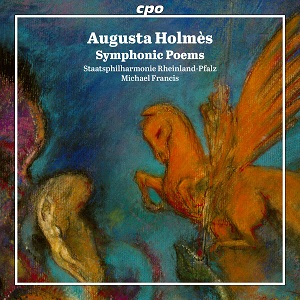Augusta Holmès (1847- 1903), eine französische Komponistin britischer und irländischer Herkunft, studierte u.a. bei César Franck. Camille Saint-Saëns schrieb über Holmès in der Zeitschrift Harmonie et Mélodie: « Wie Kinder haben Frauen keine Vorstellung von Hindernissen, und ihre Willenskraft überwindet alle Schranken. Mademoiselle Holmès ist eine Frau, eine Extremistin ».
Sie komponierte Opern, Vokalmusik, Kammermusik, Klaviermusik und symphonische Musik, wobei die Tondichtungen den größten Teil dieses Segments ausmachen.
Das Programm dieses Albums beginnt mit dem dreiteiligen Opus Roland furieux nach dem gleichnamigen Werk von Ariosto. Roland furieux erzählt die Geschichte des karolingischen Ritters, der durch die Gleichgültigkeit der Prinzessin Angélique vor Schmerz wahnsinnig geworden ist und in den Krieg zieht, wo er seine Heldentaten vollbringt. Die Musik ist im mittleren Teil ruhig, in den Ecksätzen dem Titel entsprechend furios.
Irlande ist ein politisches Manifest und ein Plädoyer für politische Freiheit, ein Anliegen, das Augusta Holmès sehr am Herzen lag. Die Komponistin verwendete darin das traditionelle irische Lied Let Erin Remember von Thomas Moore, das den Verlust der irischen Unabhängigkeit beklagt.
Es folgt Pologne, ebenfalls ein politisch gefärbtes Werk, das von Tony Robert-Fleurys Gemälde ‘Das Massaker von Warschau’ inspiriert wurde.
Es zeigt eine Szene des polnischen Aufstands von 1861, als die Polen gegen den russischen Besatzer protestierten, bei dem Tausende von den Russen barbarisch niedergeschossen wurden.
Andromède ist die letzte vollständig komponierte symphonische Dichtung von Augusta Holmès. Es geht darin um die Befreiung der Tochter der Kassiopeia durch Perseus.
Beendet wird das Programm mit dem rein orchestralen, zärtlich-lyrischen Intermezzo Andante Amoroso aus der Ode-Symphonie Ludus pro patria, für Chöre und Orchester.
Die sehr melodischen Stücke zeigen alle deutlich den Einfluss von César Franck und von Richard Wagner, den Holmès verehrte.
Warum diese Musik nicht so bekannt ist, wie sie es sein müsste, hat wohl viele Ursachen, dass sie nun in hervorragenden Interpretationen verfügbar ist, ist ein großes Plus. Ich kann nur sagen: Hört euch diese Stücke an, sie sie exzellent, und höchst beeindruckend.
Augusta Holmès (1847-1903), a French composer of British and Irish descent, studied with César Franck, among others. Camille Saint-Saëns wrote of Holmès in the journal Harmonie et Mélodie: « Like children, women have no concept of obstacles, and their willpower overcomes all barriers. Mademoiselle Holmès is a woman, an extremist. »
She composed operas, vocal music, chamber music, piano music and symphonic music, with tone poems making up the largest part of this segment.
The program of this album begins with the three-part opus Roland furieux, based on Ariosto’s work of the same name. Roland furieux tells the story of the Carolingian knight who, driven mad by the indifference of Princess Angélique, goes to war where he performs his heroic deeds. The music is calm in the middle section and furious in the outer movements, in keeping with the title.
Irlande is a political manifesto and a plea for political freedom, a cause close to Augusta Holmès’ heart. In it, the composer used the traditional Irish song Let Erin Remember by Thomas Moore, which laments the loss of Irish independence.
This is followed by Pologne, another politically tinged work inspired by Tony Robert-Fleury’s painting ‘The Warsaw Massacre’.
It depicts a scene from the Polish uprising of 1861, when Poles protested against the Russian occupiers and thousands were barbarically shot by the Russians.
Andromède is the last fully composed symphonic poem by Augusta Holmès. It is about the liberation of the daughter of Cassiopeia by Perseus.
The program concludes with the purely orchestral, tenderly lyrical intermezzo Andante Amoroso from the ode-symphony Ludus pro patria, for choir and orchestra.
The highly melodic pieces all show the influence of César Franck and Richard Wagner, whom Holmès admired.
There are probably many reasons why this music is not as well-known as it should be, but the fact that it is now available in excellent interpretations is a big plus. I can only say: listen to these pieces, they are excellent and most impressive.


















